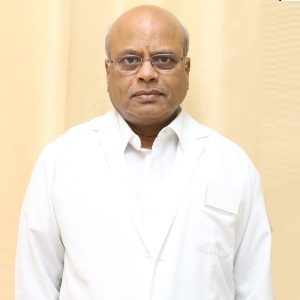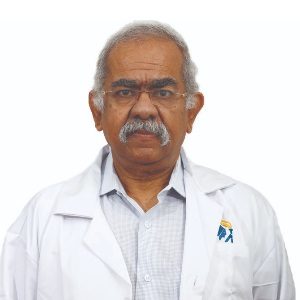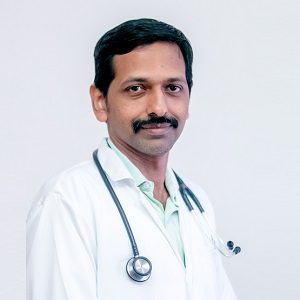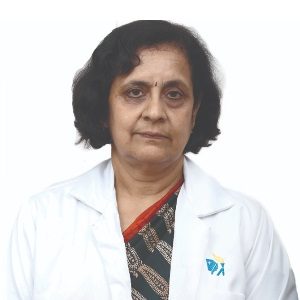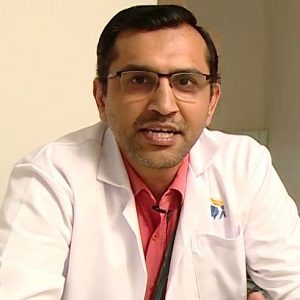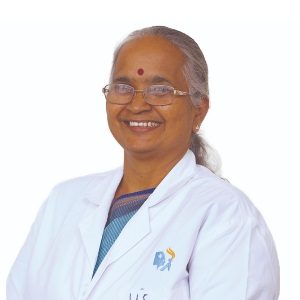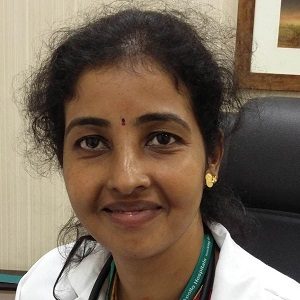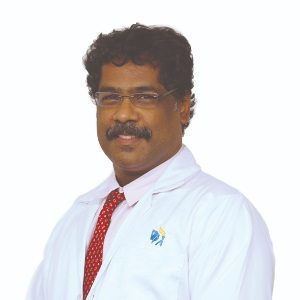Best Doctors in India for Capsule Endoscopy
- Surgical Gastroenterologist, Chennai, India
- Over 27 years’ experience
Profile Highlights:
- Dr. Surendran R is an experienced gastroenterologist from Chennai, Tamil Nadu.
- He has been rewarded for his contributions to the field several times. He received The Best Doctor award from the Tamil Nadu government (2002) in his name.
- Being a gastroenterologist, he specializes in treating patients with problems such as Bowel Obstruction, Pancreatic diseases, Esophagus disorders, Fistula treatment, etc.
- Gastroenterologist and GI Medicine Specialist, Chennai, India
- Over 23 years’ experience
Profile Highlights:
- Dr. Revathy Shanmugam is an experienced Gastroenterologist in Tamil Nadu, having an experience of 23 years in the management of GI disorders, Training & Teaching.
- She is highly skilled in the services like Liver Disease Treatment and Inflammatory Bowel Disease (IBD) Treatment.
- She has published various scholarly works in many National & International Publications of Medical Gastroenterology.
- Gastroenterologist and GI Medicine Specialist, Chennai, India
- Over 32 years’ experience
Profile Highlights:
- Dr. Hariharan Muthuswamy is a veteran Gastroenterologist and Hepatologist in India with 22 years of experience (specialist).
- Dr. Muthuswamy treated his patients with Non-Surgical Piles treatment, Liver Disease Treatment, Hepatitis E, Hepatitis A Treatment and Hepatitis B Treatment, Hemorrhoids Treatment, Colonoscopy, Stomach, and Intestinal Treatments, etc.
- He has a special interest in Capsule Endoscopy, Therapeutic Endoscopy, GERD, and Irritable Bowel Syndrome (IBS).
- Gastroenterologist and GI Medicine Specialist, Chennai, India
- Over 32 years’ experience
Profile Highlights:
- Dr. Mohan A T is a veteran GI medicine specialist in India with an experience of 32 years.
- Dr. Mohan, an alumnus of Madras University, is the Co-Ordinator of the Indian Society of Enteral and Parenteral Nutrition.
- He is an expert in treating Gastritis, acidity, Ulcerative Colitis, and many other Intestinal and bowel-related Treatments. In addition to these, he offers Colonoscopy, Gastroscopy, and Endoscopy.
- Gastroenterologist and GI Medicine Specialist, Chennai, India
- Over 15 years’ experience
Profile Highlights:
- Dr. Piramanayagam P is one of the young Gastroenterologists in India, having an experience of 15 years in the field.
- The doctor offer services like Gall Bladder (Biliary) Stone treatment, IBS treatment, Acidity Treatment, Endoscopy, and stomach and intestine dysfunction.
- He published many review articles and books under his name.
- Gastroenterologist and GI Medicine Specialist, Chennai, India
- Over 39 years’ experience
Profile Highlights:
- Dr. Sarojini Parameswaran is one of the renowned Gastroenterologist with an overall experience of 39 years.
- Dr. Parameswaran is brilliant and quick with diagnosis. She has 22 years of specialist experience.
- Gastroenterologist and GI Medicine Specialist, Chennai, India
- Over 24 years’ experience
Profile Highlights:
- Dr. Seshadri Venkatesh P is a well-known Gastroenterologist in India, having 24 years of experience in Stomach and Intestine disorders.
- Dr. Seshadri acquired proficiency in managing Bladder Cancer surgery, hemorrhoids, Irritable Bowel Syndrome (IBS) Treatment, etc.
- He holds membership in Tamil Nadu Medical Council.
- Gastroenterologist and GI Medicine Specialist, Chennai, India
- Over 40 years’ experience
Profile Highlights:
- Dr. Usha Srinivas is a Gastroenterologist in India with an experience of 40+ years in GI in medicine and academics.
- Patients visit her for consultation and treatment of abdominal pain, Gall Bladder (Biliary) Stone, Gastroenteritis, Jaundice, Colonoscopy, Steatosis, Constipation Treatment, Hepatitis C Treatment, Hepatitis E Treatment, Hemorrhoids Treatment, Piles Treatment (Non-Surgical), Gastritis Treatment, Ulcerative Colitis Treatment, and others.
- Gastroenterologist and GI Medicine Specialist, Chennai, India
- Over 18 years’ experience
Profile Highlights:
- Dr. Preethi M is one of the best gastroenterologists in India, with 18 years of expertise.
- Dr. Preethi received many awards for her contribution to the field.
- She offers consultation for Irritable Bowel Syndrome (IBS), Hemorrhoids, Endoscopy, female problems, and other gastrointestinal issues.
- Gastroenterologist and GI Medicine Specialist, Chennai, India
- Over 23 years’ experience
Profile Highlights:
- Dr. Ubal Dhus is a GI specialist doctor in South India who is proficiently managing Gastroenterological disorders for the past 23 years.
- He acquired his medical degree from Madras University, Chennai, and served people with Hemorrhoids Treatment, and Irritable Bowel Syndrome (IBS) Treatment.
Best Hospitals in India for Capsule Endoscopy
Venkateshwar Hospital, Dwarka, New Delhi
- City: New Delhi, India
Hospital Highlights:
- State-of-the-art technology and devoted healthcare professionals have been brought together under one roof at Venkateshwar Hospital to provide genuine medical care. The hospital’s professionals work together as a team to deliver the best possible treatment to their patients, using the most sophisticated equipment and information technology.
- Venkateshwar Hospital’s mission is to attain global excellence in healthcare by employing evidence-based, ethical clinical practices and cutting-edge technology by a team of highly skilled experts.
MGM Healthcare, Chennai
- City: Chennai, India
Hospital Highlights:
- Located in Chennai, India, MGM Healthcare is a top multispecialty hospital that provides all medical services under one roof.
- Since its founding in 2019, MGM Healthcare has quickly become a leading national referral centre, creating several innovative flagship initiatives.
- MGM Healthcare combines next-generation medical and digital technologies to provide better patient results.
- With 12 centres of excellence, more than 400 inpatient beds, 100 intensive care unit beds, and 24/7 emergency care, MGM Healthcare leaves no chance in redefining the patient experience in Chennai.
- MGM Healthcare boasts 250+ expert doctors across 30+ departments, including Cardiology, Pulmonology, Neurology, Obstetrics & Gynaecology, and more.
- They house 12 specialized Centres of Excellence, including Neurosciences, Orthopaedics, and Multi-Organ Transplantation.
- Their team of doctors, nurses, and paramedics works together to give every patient individualized treatment.
Capsule Endoscopy
Capsule Endoscopy is a procedure that can let your doctor examine the lining of the middle part of the gastrointestinal tract, which includes the three parts of the small intestine. This procedure makes the use of a tiny wireless camera to take pictures of your digestive tract. The camera sits inside a vitamin-size capsule that you swallow, which travels through the digestive tract, and takes thousands of pictures that are transmitted to a recorder that you are able to wear on a belt around the waist.
The procedure is used as traditional endoscopy procedures are not able to reach inside your small intestine.
Purpose
Capsule endoscopy is recommended for several reasons which include:
- Finding the cause of gastrointestinal bleeding- Capsule endoscopy is most commonly done to explore unexplained bleeding in the small intestine.
- Diagnosing cancer– Capsule endoscopy can show tumors that are located in the small intestine or other parts of your digestive tract.
- Diagnosing inflammatory bowel diseases like Crohn’s disease- Capsule endoscopy can help in revealing areas of inflammation in the small intestine.
- Diagnosing celiac disease- Capsule endoscopy is also used for diagnosing and monitoring the immune reaction to eating gluten.
- Screening for polyps- People who have inherited syndromes that can lead to polyps in the small intestine can also occasionally undergo capsule endoscopy.
- Examining the esophagus- Capsule endoscopy is also able to evaluate the muscular tube connecting your mouth and your stomach (esophagus) in order to look for abnormal and enlarged veins (varices).
- Doing follow-up testing after X-rays or other imaging tests- Sometimes when the results of imaging are unclear and not conclusive, a capsule endoscopy might be recommended by your doctor for getting more information.
Preparation
Before the procedure, it is likely that your doctor will ask you to follow certain instructions. In order to help the camera capture clear images of the digestive tract, you will need to stop consuming food and drink at least 12 hours before the procedure. Sometimes your doctor might also ask you to take a laxative before the procedure, as this can help flush out your small intestine. This can improve the quality of the pictures that are collected by the camera of the capsule.
To keep the medication from interfering with the camera, your doctor may also ask you not to take certain kinds of medication before your procedure.
In the majority of cases, you should be able to resume your normal routine after you swallow the camera capsule. However, you are generally asked not to do any kind of strenuous exercise or heavy lifting. If you do an active job, talk with your doctor regarding when you should be able to resume work.
On the day of the procedure, first, your healthcare team will ask you to remove your shirt so that they can attach adhesive patches to your abdomen. Each of the patches contains an antenna with wires that connect to a recorder. Some devices may not require the patches.
You will be wearing the recorder on a special belt around your waist. The camera will be able to send the images to the antenna patches on your abdomen, which will be feeding the data to the recorder. The recorder will be collecting and storing the images.
Procedure
Once the recorder is connected and ready, you are able to swallow the camera capsule with water. After you swallow it, you will not feel it.
You can then resume your daily routine, which can include driving as well. However, your doctor will let you know about any restrictions such as avoiding any kind of strenuous activity, such as running and jumping.
After you swallow the capsule, wait for at least two hours before you drink any kind of clear liquids. You should be able to have a light lunch or a snack after around four hours unless your doctor advises otherwise.
The procedure is complete after around eight hours when you pass on the camera along with your bowel movement. Then you are able to remove your patches and the recorder from the body, and also follow the doctor’s instructions regarding returning the equipment.
If the capsule doesn’t come out in the toilet within a period of two weeks, then you will need to contact your doctor. An X-ray might be ordered to see if the capsule is still in the body.
After the procedure
After the procedure is complete, the saved images are transferred to a computer, with special software that strings the images together for creating a video. Your doctor is able to watch the video in order to look for any abnormalities in your digestive tract.
Receiving the results of your capsule endoscopy should take a few days to a week. Once it is ready, your doctor is able to share the results with you.
Risks
The procedure is generally safe but carries a few risks. In some cases, it is possible for the capsule to get lodged in your digestive tract, rather than leaving your body within a few days through a bowel movement.
Though the risk is small, for people having certain conditions, such as a tumor, the risk might be higher. If you have abdominal pain, or you are at risk of narrowing your intestine, your doctor will likely have you get a CT scan to look for a narrowing before using the procedure. Even if the CT scan doesn’t show any narrowing, there is still a small chance that the capsule might get stuck.
In some cases, the capsule might not leave the body but does not cause any kind of signs or symptoms. In such cases, your doctor will likely give the capsule some more time in order to leave the body.
However, if the capsule which is stuck, does cause signs and symptoms, then it might be removed through surgery or a traditional endoscopy.

